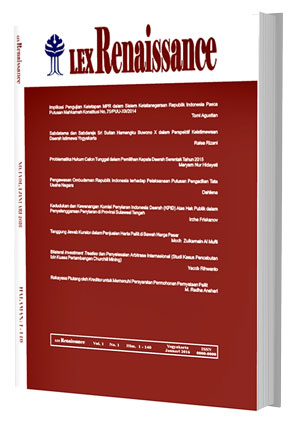Main Article Content
Abstract
The signing of Memorandum of Understanding in Helsinki between the Free Aceh Movement (GAM) and the Republic of Indonesia (RI) is a sign of peace for the conflict in Aceh. Among the points of agreement is the establishment of the Truth and Reconciliation Commission (KKR) in Aceh. This study aims to investigate and explain the basis for KKR establishment as well as the concept of Aceh KKR. To answer this, the author uses a juridical-normative approach with the library research method. We find that the formation of KKR in Aceh is based on Article 229 of Law No. 11 of 2006 concerning Aceh Government. However, based on the a quo Law, Aceh KKR is referred to as part of National KKR, while National KKR has yet to be established until today. In addition, the institutional concept of Aceh KKR is independent and non-structural with the aim of strengthening peace, helping to achieve reconciliation between perpetrators of human rights violations and victims, and recommending comprehensive reparation for victims of human rights violations. Aceh KKR is based on Islam, Acehnese, independence, impartiality, non-discrimination, democratization, justice and equality, as well as legal certainty.
Keywords: Commission; truth; reconciliation; Aceh; human rights
Article Details
Authors who publish with this journal agree to the following terms:
a. Authors retain copyright and grant the journal right of first publication with the work simultaneously licensed under a Creative Commons Attribution License that allows others to share the work with an acknowledgement of the work's authorship and initial publication in this journal.
b. Authors are able to enter into separate, additional contractual arrangements for the non-exclusive distribution of the journal's published version of the work (e.g., post it to an institutional repository or publish it in a book), with an acknowledgement of its initial publication in this journal.
c. Authors are permitted and encouraged to post their work online (e.g., in institutional repositories or on their website) prior to and during the submission process, as it can lead to productive exchanges, as well as earlier and greater citation of published work (See The Effect of Open Access).



